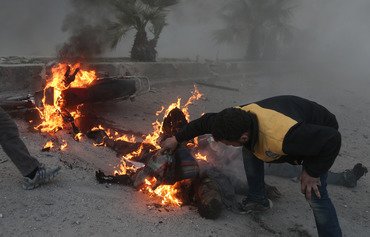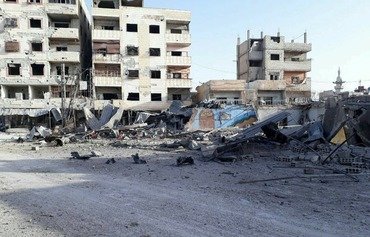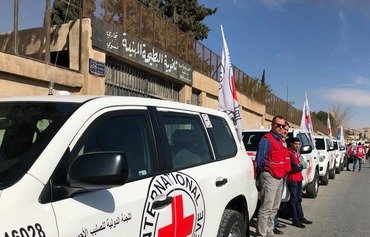A daily five-hour humanitarian pause in the fighting in Eastern Ghouta to allow civilians to evacuate the embattled opposition enclave for regime-held territory has met with little response from residents, activists in the area said.
They described the truce -- ordered by regime ally Russia -- as no more than ink on paper, as the shelling and airstrikes continued, killing several people.
"Nothing has changed" in the enclave outside Damascus since the announcement of a daily five-hour truce beginning Tuesday (February 27th), said activist Mohammed al-Beik of the Eastern Ghouta co-ordination committee.
On Wednesday, the shelling and airstrikes receded to some degree, but did not stop altogether during the five-hour truce, he told Diyaruna.
![A resident of the opposition-held enclave of Eastern Ghouta looks at what remains of his house after heavy regime bombardment. [Photo courtesy of Ghouta Media Centre]](/cnmi_di/images/2018/03/01/11687-Ghouta-house-ruins-600_384.jpg)
A resident of the opposition-held enclave of Eastern Ghouta looks at what remains of his house after heavy regime bombardment. [Photo courtesy of Ghouta Media Centre]
![Buses and ambulances stand empty at al-Wafideen crossing, through which residents of Eastern Ghouta were encouraged to leave during the humanitarian truce on Tuesday (February 27th). [Photo courtsy of Mohammed al-Beik]](/cnmi_di/images/2018/03/01/11688-Ghouta-wafideen-crossing-600_384.jpg)
Buses and ambulances stand empty at al-Wafideen crossing, through which residents of Eastern Ghouta were encouraged to leave during the humanitarian truce on Tuesday (February 27th). [Photo courtsy of Mohammed al-Beik]
This was particularly the case in direct combat zones such as Hosh al-Zawahira and Shaifuniyeh, where regime forces are trying to advance, he said.
Humanitarian corridor not in use
A designated humanitarian corridor has been set up near al-Wafideen camp, al-Beik said, adding that no resident, civilian or otherwise, has dared to leave through it for regime-held areas.
"The regime’s military opponents fear the fate that awaits them if they leave, including arrest," he said, "while civilians fear they will be subjected to interrogation by security agencies and moved to unknown locations."
Residents also fear the arrest warrants issued in absentia for their young sons, particularly those who are at compulsory military service age, he said.
These young men "could be arrested on the spot, taken to training camps and forced to take part in the ongoing war" on the side of the regime, he said.
According to al-Beik, everyone in Eastern Ghouta wants the war and bloodshed to stop, but not by vacating the region, as the terms of the truce stipulate.
Areas hit by the bombardment on Wednesday included the town of Beit Sawa, where two people were killed, the cities of Harasta and Douma, and the towns of Otaya and Hosh al-Zawahira, he said.
As rubble is removed at the site of buildings that collapsed as a result of the bombardment, a large number of civilian casualties have come to light, he said, with six bodies uncovered Wednesday in Shaifuniyeh that had been buried for three days.
Aid convoy blocked
On Wednesday, UN under secretary-general for humanitarian affairs Mark Lowcock said there has been no access for humanitarian convoys, nor authorisation by the regime to go into the besieged areas, nor medical evacuations since the Security Council ceasefire resolution was passed Saturday.
About 40 trucks were loaded and ready to ferry relief supplies to Eastern Ghouta, but there has been no let up in the fighting, he said.
"When will your resolution be implemented?" he asked, staring fixedly at members of the UN Security Council, who listened in complete silence.
Lowcock said trucks loaded with supplies have been poised to go to 10 besieged areas including Douma, since Saturday.
Carl Skau, the deputy Swedish ambassador to the UN, demanded "immediate access" for the humanitarian aid.
"There is no time to lose," he said.

![A Syrian child takes advantage of a lull in the shelling to leave the shelter in Eastern Ghouta. [Photo courtesy of Ghouta Media Centre]](/cnmi_di/images/2018/03/01/11685-Syria-ghouta-child-600_384.jpg)






